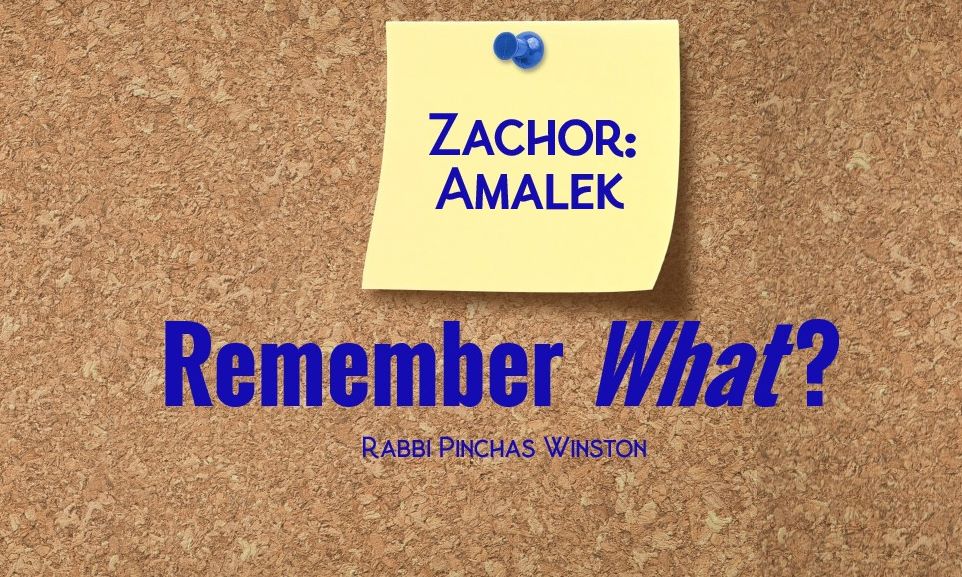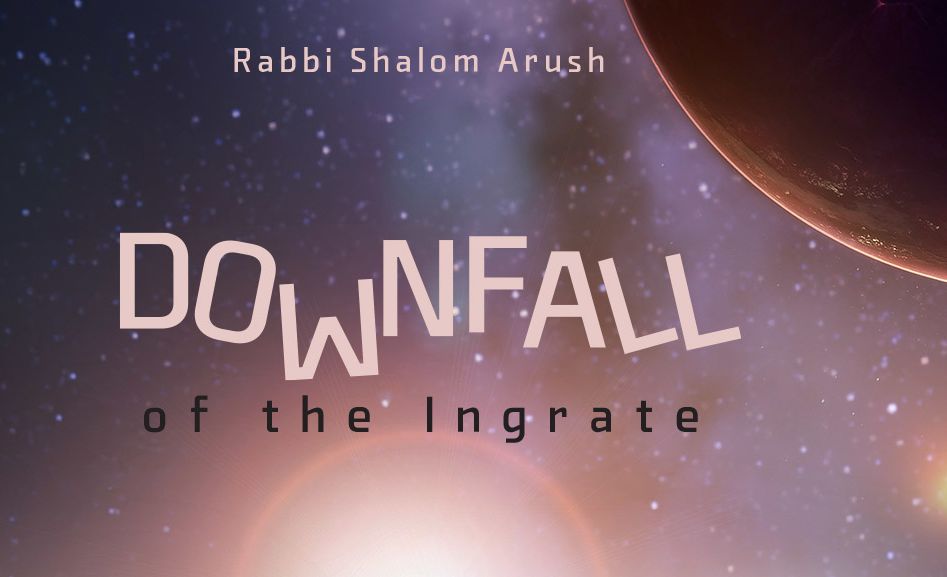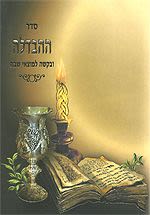
Shabbat Zachor: Remember What?
Before Amalek came, we had been quite content to live under a foreign ruler in a foreign land, and we didn't seem to be in too big a rush to go back to Eretz Yisroel…

Remember what Amalek did to you on your way out of Egypt, when he chanced upon you on the way . . . (Devarim 25:17)
You can truly feel Purim knocking loudly when Parashat Zachor arrives. Parashat Zachor recalls what Amalek did to us on the way out of Egypt, and Purim recalls what Haman, a direct descendant of Amalek tried to do us on our way out of Bavel, 960 years later.
The truth is, until Haman came along, we weren’t going anywhere, physical or spiritually. We had been quite content to live under a foreign ruler in a foreign land, and we didn’t seem to be in too big a rush to go back to Eretz Yisroel and rebuild the destroyed Temple. However, Haman’s rise and fall led to the Purim Miracle, redemption, and a new direction in history.
Once Ezra finally made the move back to Eretz Yisroel, he had difficulty convincing the vast majority of Jews to follow him. The 70 years of Babylonian exile had taken their toll, and even though the Purim Miracle resulted in a deeper commitment to the Oral Law (Shabbos 88a), it did not result in a deeper commitment to the ultimate goals of the Jewish people. Thus, the Second Temple failed to become the final one, and the Jewish people have never again enjoyed complete independence and security in their service of G-d.
When we arrived in Babylonia after Nebuchadnezzar destroyed the First Temple (3338/423 BCE), we intoned:
By the waters of Babylon — there we sat and also wept when we remembered Tzion . . . (Tehillim 137:1)
And we vowed:
If I forget you, O Jerusalem, let my right hand forget its skill. Let my tongue adhere to my palate if I fail to recall you, if I fail to elevate Jerusalem above my foremost joy. (Ibid. 5-6)
Well, so much for that. With the exception of a few, the generation that had felt that way must have died out by that point. Most of the Jews of the Purim story had probably been born and raised in exile. How can you remember something you never experienced? You can remember what the Torah says about them, as we do each day as we say the “Six Remembrances” found after the morning service in most siddurim (prayer books). And what Amalek did to us is one of them. But to remember them emotionally, is not possible.
Yet, didn’t someone wise once say quite ominously, “Those who forget are doomed to repeat”? And, isn’t that what life is basically about, not being doomed to repeat past mistakes? And, shouldn’t it really say, “Remember what you did to bring on Amalek,” because as we saw a few parshiot ago, he was a result of OUR actions, as Rashi says:
They traveled from Refidim and came to the Sinai Desert . . .(Shemot 19:2)
What does the Torah teach us by stating again that they came from Refidim? . . . In order to make a comparison between their journey from Refidim to their arrival in the Sinai Desert: just as their arrival in the Sinai Desert was in teshuvah, so too they left Refidim having done teshuvah. (Rashi)
Teshuvah for what? Again, Rashi provides the key: THEN CAME AMALEK: The Torah places this section immediately after this verse (when they said, “Is G-d among us or not?”) to imply, “I am always among you and ready at hand for everything you need, and yet you say, ‘Is G-d among us or not?’ By your lives, that dog shall come and bite you, and you will cry for Me and then you will know where I am!” It is like a man who carried his son on his shoulders and went on a journey. The son saw an article and said, “Father, pick up that thing and give it to me.” He gave it to him, and so a second time and also a third time. Yet, when they met a certain man along the journey, the son asked him, “Have you seen my father anywhere?” Therefore, the father said to him, “You do not know where I am?” At which point he put him down and a dog came and bit him. (Rashi, Shemot 17:8)
Thus, teshuvah is necessary for having questioned G-d’s loyalty to the Jewish people. Teshuvah is obligatory for having lacked trust and faith in G-d and His Providence. Teshuvah for having created a reality that made the attack of Amalek possible, may he be destroyed once and for all, amen.
***
Pinchas Winston is the author of over 95 books on various topics that deal with current issues from a traditional Jewish perspective. He has also written on the weekly Torah reading since 1993, called “Perceptions”, as well as on current topics and trends affecting Jewish history, past and present. One of his missions is to make the depth and beauty of the more mystical teachings of Torah understandable and accessible to those who can really benefit from them. Visit his website at thirtysix.org.










3/11/2022
It is always time for Teshuva. Let us return to Hashem with a genuine Emuna. The world is coming closer to a major crisis. Only Teshuva can save us and this world.